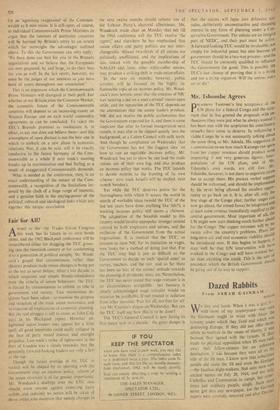Fair for All?
AWAKE or die—the Trades Union Congress this week has its future in its own hands alone, and the 1962 Blackpool conference will be remembered either for dragging the TUC groan- ing into the twentieth century or for condemning it to a generation of political atrophy. Mr. Wood- cock's gospel that circumstances rather than theories produce trade union changes is being put to the test as never before. After a lost decade in which suspicion and simple bloody-mindedness were the criteria of union behaviour, the TUC is forced by circumstances to rethink its role in government and society. Two momentous de- cisions have been taken--to examine the purpose and structure of the trade union movement, and to examine all implications of economic planning. But the real struggle is still to come, as John Cole says in his Blackpool report. However en- lightened union leaders may appear for a brief spell. all good intentions could easily collapse in the face of petty vested interest and outright prejudice. Last week's strike of lightermen in the Port of London was a timely reminder that the genuinely forward-looking leaders are only a few at the top.
Though the future prestige of the 7-UC in society will be shaped by its sparring with the Government over an incomes policy. reform of the union structure is of far greater importance. Mr. Woodcock's dealings over the ETU case should warn anyone against expecting hasty action, and certainly no notice will be taken of those critics who maintain that speedy ehanges.in
the next twelve months should remove one of the Labour Party's electoral albatrosses. Mr.
Woodcock made clear on Monday that not till
:he 1964 conference will the TUC receive 'the report,' and elsewhere he has emphasised that
union affairs and party politics are not inter- changeable. Almost two-thirds of all unions are politically unaffiliated, and the implications of this, linked with the possible membership of NALGO and, later. other white-collar unions, may produce a striking shift in trade union affairs.
In the next six months, however, public scrutiny will be focused an the highly in- flammable topic of an incomes policy. Mr. Wood- cock's now historic sneer that the creation of NIC was `sending a lad on a man's errand' meant open strife, and the reputation of the TUC depends on the alternatives that the union leaders produce. NIC did not receive the public acclamation that the Government expected for it, and there is some suspicion that after its formal inauguration next month, it may slip or be slipped quietly into the background, as a Cohen Council with milk teeth. And though he complained on Wednesday that the Government has not 'the foggiest idea' on how to run an equitable incomes policy, Mr. Woodcock has yet to show he can lead the trade unions out of their own fog. and also produce an incomes policy that works The TUC intends to devote months to the framing of its own scheme: next week Israel's will be studied, next month Sweden's.
Yet while the TUC deserves praise for the thoroughness with which it scours the world in search of workable ideas (would the TUC of the last ten years have done anything like this?), a working incomes policy still seems a chimera. The adaptation of the Swedish model to this country would involve unpopular stronger central control by both employers and unions, and the exclusion of the Government from the actual negotiations. It is ironical that the TUC, so anxious to slam .NIC for its limitation to wages, now looks for a method of doing just that. For the TUC may find it just as difficult as the Government to decide on such 'special cases' as nurses, teachers, and the rest, and so far there has been no hint of the unions' attitude towards the planning of dividends, rents. etc. Nevertheless, the TUC has never stated that wage restraint is in no circumstances acceptable: last January it clearly acknowledged wage restraint would on occasion be justifiable, if not treated in isolation from other incomes. 'Fair for all, not free for all' was Mr. Cousins's slogan on Wednesday. But can the TUC itself say how this is to be done?
The TUC's General Council is now facing its first major task in a decade: the great danger is
that the unions will lapse into defensive atti- tudes, deliberately unconstructive and shunning interest in any form of planning under a Con- servative Government. The unions are an integral part of NEDC, and their part must be active. A forward-looking TUC would be invaluable, not simply for industrial peace but also because all government should be a two-way process---and the TUC should be eminently qualified to influence the Government for good. This is possibly the TUC's last chance of proving that it is a living and not a dying organism. Will the unions wake Lip or die?


































 Previous page
Previous page